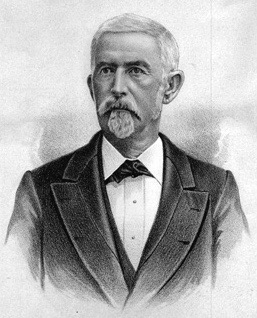Edward A. O'Neal facts for kids
Quick facts for kids
Edward Asbury O'Neal
|
|
|---|---|
 |
|
| 26th Governor of Alabama | |
| In office December 1, 1882 – December 1, 1886 |
|
| Preceded by | Rufus W. Cobb |
| Succeeded by | Thomas Seay |
| Personal details | |
| Born | September 20, 1818 Madison County, Alabama |
| Died | November 7, 1890 (aged 72) Florence, Alabama |
| Political party | Democratic |
| Military service | |
| Allegiance | |
| Branch/service | |
| Rank | Colonel |
| Unit | 9th Regiment Alabama Infantry |
| Commands | 26th Alabama Infantry |
| Battles/wars | American Civil War |
Edward Asbury O'Neal (born September 20, 1818 – died November 7, 1890) was an important person in Alabama's history. He was a brave officer for the Confederate States during the American Civil War. After the war, he became the 26th Governor of Alabama.
Contents
Early Life and Education
Edward O'Neal was born in Madison County, Alabama. His father was from Ireland, and his mother had French family roots. Edward's father passed away when he was very young.
He received a good education, studying English and classic books. In 1836, he graduated at the top of his class from LaGrange College. This college is now known as the University of North Alabama.
In 1838, Edward married Olivia Moore. They had nine children together. He then studied law and became a lawyer in 1840.
Early Career and Beliefs
In 1841, O'Neal was chosen to serve as a judge in Alabama. He worked in this role for four years.
He strongly believed that states should have the right to leave the United States. This idea is called secession. He spoke out for Alabama to secede in 1860, before the Civil War began.
Service During the Civil War
When the American Civil War started, Edward O'Neal joined the Confederate States Army. In June 1861, he became a captain. He led three companies of soldiers.
He was quickly promoted to major, then to lieutenant colonel. By March 1862, he became a colonel. He led the 26th Alabama Infantry regiment.
Key Battles and Commands
Colonel O'Neal fought in many important battles. During the Peninsula Campaign, his horse was shot from under him. He was also hurt by a shell fragment at the Battle of Seven Pines.
He was praised for his actions at the Battle of Chancellorsville. In 1863, he led a brigade (a large group of soldiers) in several battles. These included the famous Battle of Gettysburg, the Battle of Manassas Gap, and the Battle of Mine Run.
Later in the war, his regiment went back to Alabama to get more soldiers. But they were soon called back to duty in Dalton, Georgia. There, O'Neal took command of another brigade. He led this group during the rest of the Atlanta Campaign.
Edward O'Neal was appointed as a brigadier general in June 1863. However, this promotion was later canceled by Confederate President Jefferson Davis.
Life After the War
After the Civil War ended, O'Neal went back to being a lawyer. In 1875, he was chosen to be part of a special meeting in Alabama. This meeting helped write a new constitution for the state. He led the committee that focused on education.
In 1880, he supported Winfield Scott Hancock for president. He traveled around Alabama giving speeches.
Governor of Alabama
From 1882 to 1886, Edward O'Neal served as the Democratic Governor of Alabama. He worked hard for the state during his time in office.
Death and Lasting Impact
Edward O'Neal passed away in Florence, Alabama, on November 7, 1890. He was 72 years old.
His son, Emmet O'Neal, also became Governor of Alabama. He served two terms from 1911 to 1915.
A bridge over the Tennessee River is named in Edward O'Neal's honor. It connects Florence and Sheffield, Alabama. This bridge is called the O'Neal Bridge.
 | George Robert Carruthers |
 | Patricia Bath |
 | Jan Ernst Matzeliger |
 | Alexander Miles |

